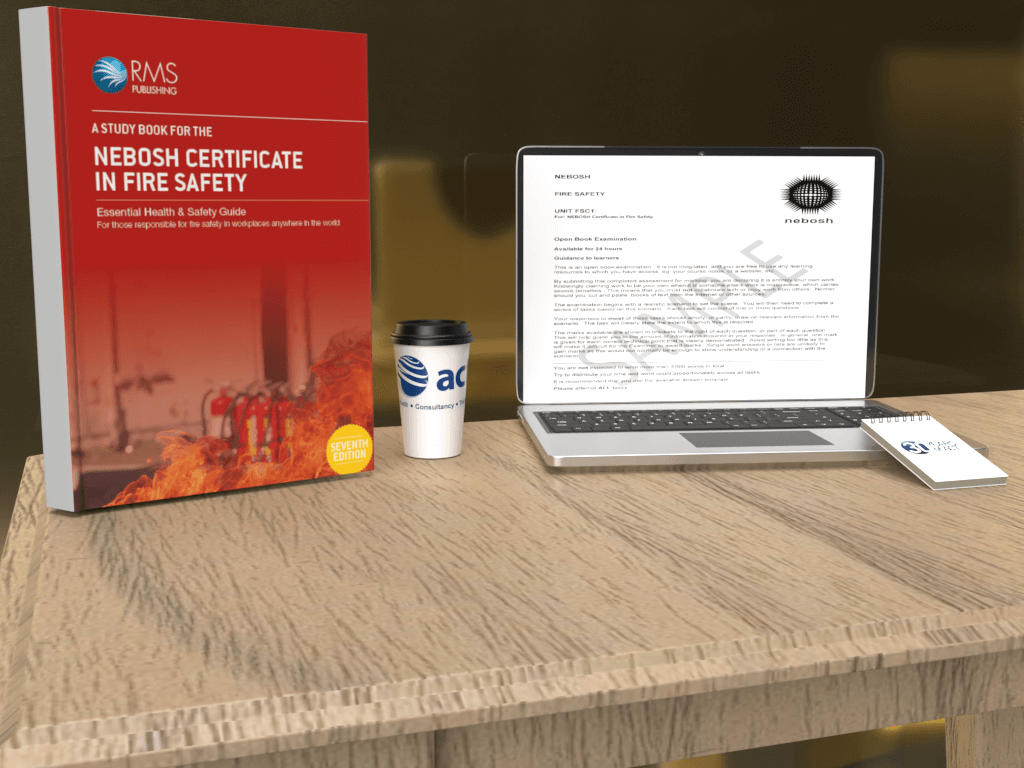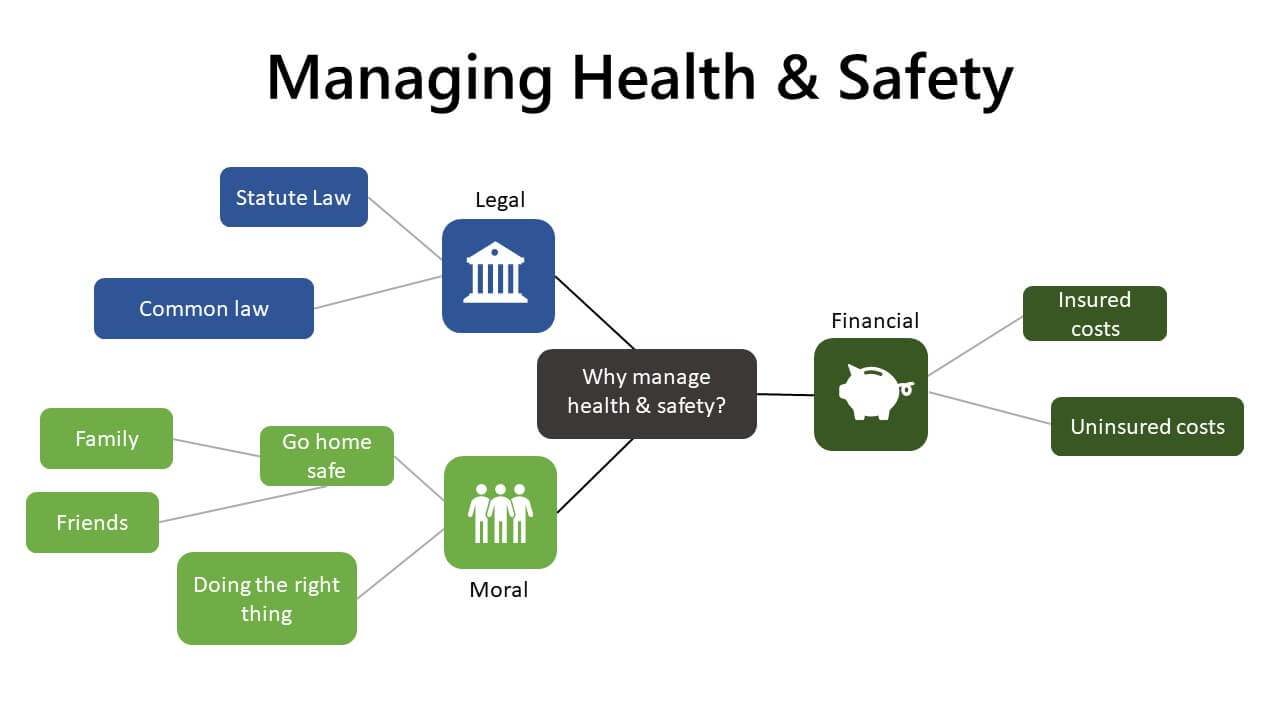We interviewed our health and safety advisor, Matthew Coombes, to find out what he made of the new assessments. Matthew has completed his NEBOSH General Certificate and has sat the Fire Certificate Open Book Examination in September 2021.
What do you think about the new open book exams?

I find the new assessment style to be a real benefit to me, I’ve always struggled with handwritten exams because I’ve not got the neatest handwriting, and I find them very stressful. The new open book format means you can choose where you sit the exam, so you can make the environment suit your needs.
For me, this means a nice quiet room on my own, with a cup of coffee, a computer with multiple screens, and no haunting memories of furiously scribbling down everything I can remember at 100 miles per hour.
The other great thing about the new open book examinations (OBEs) is that they’re scenario-based. This means that the assessment is not based on remembering every little detail of the syllabus, but instead, it’s about how you can interpret your learning to apply to the scenario that NEBOSH describe.
However, this does mean that you can get a scenario that you find difficult because it’s not relevant to anything that you have personally experienced. A good example of this is the exam paper that I had for my Fire Certificate OBE. The paper was based on a hair salon, and I hadn’t been for a haircut for a while before the first lockdown in March 2020, and still hadn’t been for one at the time of my exam. This meant that I had a limited frame of reference with which to visualise the scenario properly as if I was there in person and applying my knowledge.
How did you get on with the General Certificate open book exam?
The General Certificate was my first experience of an open book examination, so I decided to opt for a tutorial day. This was a great choice because it helped me to solidify all of my learning, and I really benefitted from the tutor’s guidance on writing NEBOSH exam answers. Plus, the other learners in the tutorial had some really great questions and tips that I used on the day.
On exam day, I decided to separate the planning and writing portions of my assessment by printing off the paper and working through each question with a different highlighter and pen. I made rough notes and labelled the things that I thought were relevant to each question. Then one at a time I typed up my answer to each question in Word.
For the General Certificate OBE, I used the HSE website, A Study Book For The NEBOSH National General Certificate 11th Edition, my course and tutorial notes, specific legislations relevant to the exam, and a fair bit of googling to write my paper.
Did you do anything differently for the Fire Certificate exam?

For the Fire Certificate, following the advice of my tutor, I printed off one copy of the question paper, but a new copy of the scenario for each of the questions. This probably isn’t very environmentally friendly, but it’s only once and the paper can be re-used. This allowed me to go through the scenario with a fresh eye after each question and cleared up a lot of the chaos and clutter that was found on my first paper with the use of 10 different colours and a numbering system.
During my Fire Certificate exam, I used relevant legislation, A Study Book For The NEBOSH Certificate in Fire Safety 7th Edition, my course and revision notes, and items from around the house that were relevant to the content of the question paper, such as a hairspray can.
I had the added benefit of being alone in the house for this exam, so there was no one bothered by me playing music or talking to myself about hypothetical fire scenarios!
How did you revise for your open book assessments?

Mind maps – Mind maps are a great way to create short but informative notes on one topic, that shows all of the other topics that link to it.
This can be invaluable during your exam to quickly refresh yourself on what sort of things NEBOSH expect you to know (and therefore to potentially write about) relating to a topic that has come up.
Flashcards – Flashcards are small note cards. With a flashcard, you have a limited amount of space to write about a topic, and this forces you to be concise and only include the most relevant information. Creating flashcards can be a good exercise in condensing your learning down into smaller, easier to recall notes or talking points.
Past papers – One of the best ways to revise is to complete a practice paper, and at the very least you should be looking through whatever past papers you can find or that you can receive from your learning partner.
At their base, past papers will show you what to expect – a scenario around 2 pages long describing a workplace, and questions equalling to 100 marks. But reading through past papers gives you an insight into the way that the scenarios are written, and how key information is hidden in plain sight in the assessment paper.
If your Learning Partner or tutor offers a service to mark your past papers, it’s definitely worth completing one as a practice run, so that you can receive some feedback and see if you need to make any improvements.
Do you have any tips for NEBOSH exams?

-
- Take your time –
The open book exam assessments provide you with 24 hours in which you can plan, research, write and submit your paper. They start at 11am (UK time), and you have until 11am the following day to have submitted your paper. This means that in most cases you really can take your time, think, plan and work through your paper gradually. I had very limited experience with health and safety prior to my General Certificate course, so the exam took me a little longer than the number of hours suggested by NEBOSH. However, I didn’t struggle for time and taking the paper bit by bit really helped to keep me calm and reduce my stress levels, which in turn helped to prevent mistakes.
-
- The environment that you take your exam in –
You might find it more difficult to stay focussed in an environment that’s noisy or busy, or where you’re going to be disturbed regularly by things like ringing phones or talking to others. This means that you will need to plan where you’re going to take your assessment in advance.
Before you begin your exam, get all your learning materials ready, check you can log into the platform, make sure you’re not going to be interrupted, and make any other exam preparations that you need to. For me, this is remembering my little figurine that has been with me to every exam I’ve taken since my GCSE’s, a couple of plants, and my speakers to play music.
- Coloured pens –
For my open book exams, I used 7 coloured ballpoint pens and 4 highlighters. Coloured pens help me to colour code my answers, pick out key information in the question paper and have it stand out from the rest of the text.
Closing Interviews:
Finally, how did you find the closing interview after the assessment?
The closing interview was really easy to organise, it only took 15 minutes, and I was able to do it online. I did feel nervous at first but the interviewer was very friendly and I think it’s a good step to making sure that NEBOSH qualifications are still respected now that they have a new examination system.